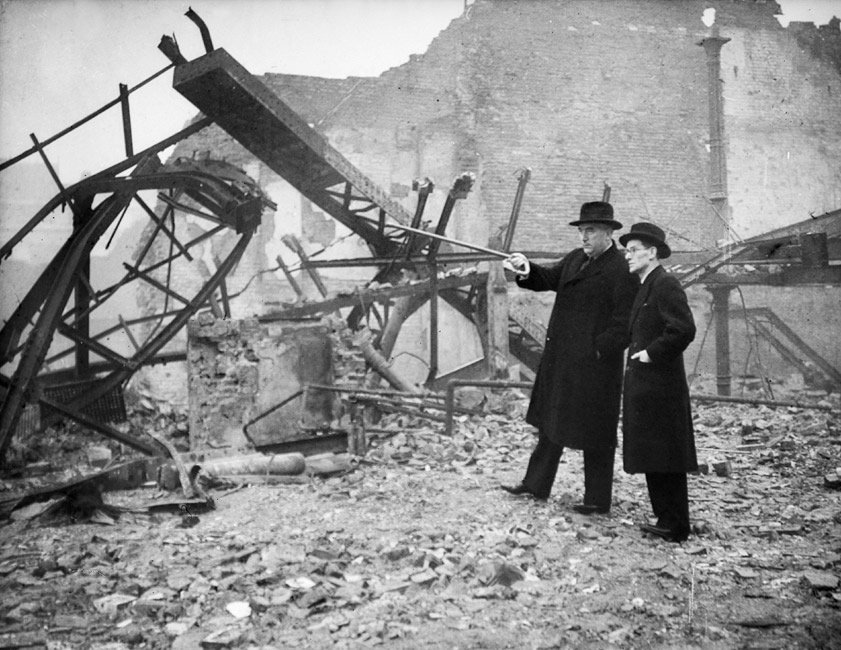On this day, 17 June 1940, Prime Minister Robert Menzies addresses the nation in response to the shocking news that France had fallen to Nazi Germany and that consequently the British Commonwealth stood virtually alone in opposition to Hitler. This was one of the darkest days in all of the Second World War, but Menzies used his trademark grasp of the English language to deliver a Churchillian message of hope and determination which helped to steel the resolve of his country.
It is difficult to overstate how startling news of the fall of France was at the time. In just a matter of weeks the Nazis had achieved what Germany had failed to do through five years of conflict and the sacrifice of hundreds of thousands of lives over the course of the Great War. The Nazi war machine had swept through most of Europe with little effort and looked as though it would be unstoppable – the loss of Britain and with it Australia’s sense of security and world order loomed large. In response to the chaos British Prime Minister Neville Chamberlain had resigned on 10 May, British troops had evacuated the continent from Dunkirk, and on 18 June the new PM Winston Churchill would famously tell his country that ‘The Battle of France is over: the Battle of Britain is about to begin’.
Prior to France’s fall, Menzies had had some trouble getting Australians to take the war effort seriously. Attempts to introduce rationing and other foresighted measures had met with great political backlash, though Menzies’s efforts to calm nerves through a slogan of ‘business as usual’ did not necessarily help matters. As the conflict moved from the so called ‘phoney war’, which lasted the winter following Poland’s fall, towards the intense action of Europe’s spring, the Prime Minister had moved on from this approach and had been using numerous radio broadcasts, speeches, and public rallies to do all he could to change the public’s attitude.
Now the nation Menzies led had a startling wake-up call, and it was up to Menzies to ensure it did not lead to panic or to despair, but instead to a renewed sense of purpose. He announced that the government was introducing emergency legislation to enable a full mobilisation of all of Australia’s resources and manpower. It would give the government unlimited powers to tax, to take property, to direct employers and employees, and to call up men for the defence of Australia. There was to be ‘one limit and one limit only’, which was that there would be no conscription for overseas service, the divisive issue which had torn Australians asunder during the Great War (though this limitation was one that Menzies would later seek to lift once Japan joined the war).
This was also the moment when Menzies first banned the Communist Party under the National Security (Subversive Organisations) Regulations. The context was the Soviets having assisted the Nazis in jointly invading Poland in 1939, and communist agents fomenting strikes and industrial action to hurt the Australian war effort. In March 1940 a 9-week coal strike had broken out in New South Wales, which would prove devastating to wartime productivity, and while this had an industrial justification many believed that the miners had been goaded into action by Communist Party-aligned union leaders.
Along with announcing the government’s policy response, Menzies gave a powerful statement which was printed in virtually every newspaper in the country. It read:
‘This is not the end of the war. On the contrary it is the beginning of its bitterest and most crucial phase. As long as Great Britain, is unconquered the world can be saved, and that Great Britain can and will be conquered is unthinkable. We must keep up our courage and work like tigers, because the fate of humanity now rests upon us. At the same time I would point out that we know nothing of the suggested terms of the armistice. We do not know whether they involve the French fleet, or what terms Hitler will impose.
We must engage in no recriminations. France has undoubtedly fought magnificently, against terrible odds and against the most efficient war machine the world has seen. The day will undoubtedly come when France will once more be liberated. It is now up to British courage, reinforced, as surely it must be, by the whole of the resources of the American continent.
I cannot believe that this cruel stroke of misfortune will leave America unmoved, or that any American can any longer doubt that the defeat of France brings the menace of Nazi Germany to his own door. Free peoples of the world must get together for a great stand. If they can do that promptly there can be no doubt that in the long run they will win.’
Further Reading:
‘Not End of War!’, The Age, 18 June 1940, 18 Jun 1940 – NOT END OF WAR! – Trove (nla.gov.au)
A.W. Martin, Robert Menzies, A Life: Volume 1 1894-1943 (Melbourne University Press, 1993).
Sign up to our newsletter
Sign up for our monthly newsletter to hear the latest news and receive information about upcoming events.


